The Broadway Show That Changed Everything

Oh my God you guys, did you know there was a musical before Hamilton? Like, a long time before. People who are old now loved it. If they had social media back then they totally would have put the playbill on Instagram just to show everyone else that they had gone and seen it. It was, like, a “raw, spontaneous, organic explosion of a show.” But how come no one has ever heard of it? Probably because it happened a million years ago and then nobody ever tried to do a musical that spoke to young people again until now? I don’t know. But one of the guys from the cast of that musical, who is somehow still alive, says, “It started to become a little bit of a machine toward the end, and the cult around the show was in some ways not super-pleasant. The energy had shifted.” So maybe that had something to do with it? That is definitely not something that will ever happen to Hamilton, so there’s no need to worry. I promise you, nothing that so many people are so deeply engaged in letting people know they are into right now could ever fade into memory or lose even a little bit of relevance. Anyway, if reading about things that happened way before your parents were born is something that sounds like fun to you, here is an oral history of that musical that people liked so long ago. It’s funny to think that anyone could get that worked up about a Broadway show, but they did things differently back then.
Spouse Profiled
If he’s as concerned as he says he is by all the “people that are from all over and they’re killers and rapists and they’re coming into this country,” he might consider building a wall around his pants. . .
He didn’t make it to Raka, where her maternal grandfather accidentally cross-bred a Ptuj and an Egyptian, creating the famed Raka red onion. . .
She has taken on her husband’s signature pout, in a connubial version of people who grow to look like their dogs. . .
These are just a few of the best lines from Lauren Collins’s Melania Trump profile, if you can call it that — as Collins writes, “Her story is so vacuous as to almost require the imagination to spackle its holes.”
Keep Shelly in Athens, "Bright Morning"
Welcome to May. Back in the Before Times we would celebrate the changing of the calendar with pleasured anticipation at the coming of summer, but now that each different day is its own separate season, sometimes several, it is hard to know what May means anymore. The National Weather Service says we won’t see the sun again until Saturday at least, so maybe May is the new early April? I don’t know what to tell you, sorry. Have some music, maybe that will distract you. ENJOY!
New York City, April 28, 2016
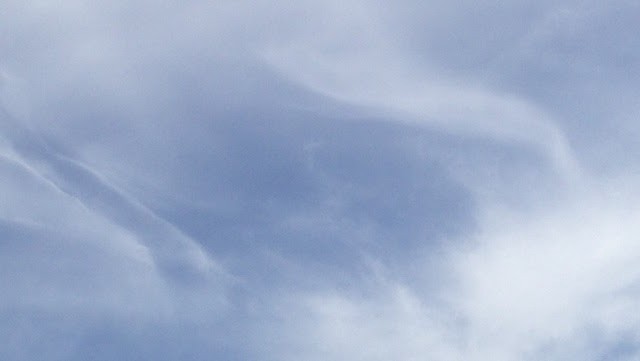
★★ Cold air blew into the subway station. Children, suitably coated or hoodied, walked hand in hand with adults in a neighborhood of workplaces. The light got warmer and the temperature or the impression of the temperature followed. Then what had been various degrees of sunniness collapsed into a damp gray. The paler and darker patches in the clouds were too blurry to have identifiable topography, while the river below lay whitish and depthless as a cutout.
Don't Bother Reading What You're Retweeting

Discussing the latest tweak to a social networking service’s algorithm last night — yes, my life is exactly as sad and empty as even a cursory examination of my work would reveal — I compared Facebook to the coffee table on which people placed their unread copies of Thomas Piketty’s Capital, i.e. a space in which to display aspirational identity (although given what some of you share on Facebook I might suggest that you aspire to something even slightly greater) with minimal effort. In the cold light of day I wondered if I hadn’t been a bit too harsh in my judgement of those who are trying to craft an image without doing much in the way of actual immersion in that which they are sharing, but along comes Science to confirm my prejudices:
An international team of human development researchers at Cornell University and Beijing University set out to investigate the cognitive effects of sharing information on social platforms. What they found was retweeting, or “re-blogging,” directly interfered with people’s learning capabilities and retention rates…. According to the study’s finding, the participants who were allowed to retweet their favorite messages submitted twice as many incorrect answers on the comprehension test than their peers in the control group. And the material they did remember indicated a poor understanding of the subject matter. “For things that they reposted, they remembered especially worse,” Wang added. What the researchers suspect is the decision to share or not to share consumes a person’s cognitive resources, which they referred to as “cognitive overload.”
The more that I think about this, the more that the only logical conclusion here is you are better off not even reading what you are going to share on social media since you won’t really understand it anyway. Once the robots are writing everything we see on the web all we’ll need to do is like and share and we can save our limited cognitive energies for important things, like running from fires and hiding from the other robots who are trying to eat us. It’s almost as if this were the plan all along!
Photo: Shutterstock.com
Phil Kives, 1929-2016
“The man who brought you the Miracle Brush, the Veg-o-matic and millions of albums containing 25 Country Hits or Hooked on Classics died Wednesday. Philip Kives was 87. Born on a Jewish colony farm near Oungre, Sask., Feb. 12, 1929, Kives came to Winnipeg in 1962 to create the company that bore the first letter of his last name, K-Tel. Kives produced a live, five-minute TV commercial — the first infomercial, he claimed — to sell a Teflon non-stick frying pan, and sales took off afterwards. From then on he always wrote and directed all the TV commercials. But wait, there’s more.”
Related: Tracks From A K-Tel Compilation Tape I Purchased When I Was Nine Just So I Could Own The “Greatest American Hero” Theme Song, In Order Of How Frequently And Irritatingly They Pop Into My Head Unbidden Some Thirty Years Later
Red Wednesday In Lalish
by Dawson Jope
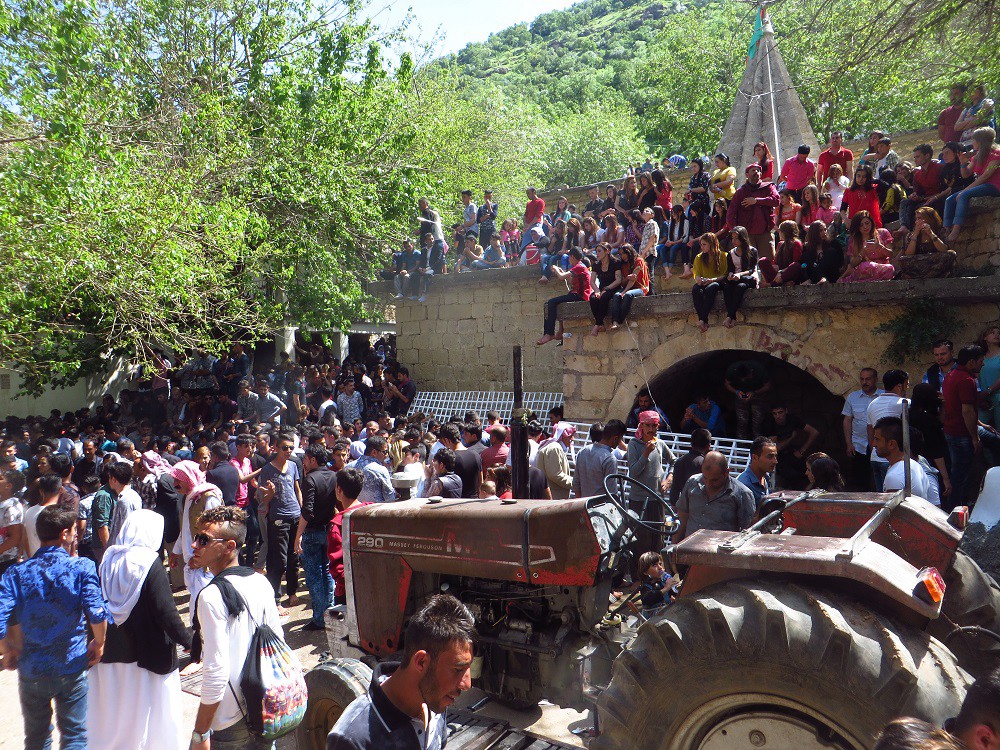
It was only a few minutes past nine in the morning, but the uneven concrete was already very warm below my feet. I was enjoying the rough surface on my soles. Going barefoot is the first custom of visiting Lalish, the most sacred village of the Yazidi faith, in Northern Iraq. Lalish was purportedly the spot where Melek Taus, a central figure in the religion also known as the Peacock Angel, first touched down to earth, immediately making the small valley a holy place. It is also home to the tomb of Sheikh Adi, the eleventh-century reformer of Yazidism. I walked up to the village among thousands of other pilgrims, all barefoot and budding with excitement. It was “Sere Sal,” the Yazidi New Year, also known as Red Wednesday, the day that Melek Taus descended upon earth. Rebirth, redemption and new beginnings are a focal point of the religion, and Sere Sal was the day to see it in full bloom.

Lalish lies in a valley with a narrow opening to the northern edge of the Plains of Nineveh. The valley is short and shallow, surrounded on three sides by the small mountains that make up the southern edge of the Zagros range in northern Iraq. The southern mountaintop above Lalish looks out above the vast plains of northern Iraq that slowly morph into the inhospitable Syrian Desert beyond the horizon.
From that same vantage point, the city of Mosul and Mosul Lake are clearly visible, the latter safely in the hands of the Peshmerga and Coalition forces, the former still under the control of the Islamic State, or “Da’esh” as it is known in the Middle East. It’s not unusual to drive along the Plains of Nineveh and see massive plumes of smoke on the horizon behind the rolling hills. Sometimes they are accompanied by the distant roar and fade of fighter jets.
On a perfectly clear day, Mt. Sinjar is visible from the mountain above Lalish. Sinjar, or “Shingal” as the Yazidis call it, is the next most sacred location after Lalish, and was home to one of the greatest concentrations of Yazidis prior to the 2014 Da’esh attack. The offensive led to a ghastly massacre that killed tens of thousands of Yazidis and displaced a few hundred thousand. The event was only retroactively labeled a genocide by the U.S. Government.

I took a staircase to the roof of a small house where I planned to sit and watch the influx of people heading into the village to picnic and celebrate. Lalish has an openness that is unusual in Iraq — walkways, houses and rooftops are almost indistinguishable in their openness — all space is shared and free to everyone, all of it an extension of the Yazidis’ belief in unconditional hospitality. I was only on the rooftop for a matter of seconds when a man called out to me.
“Hello friend! Please, come join us!” He and his family sat in a large rectangle of pillows on the far end of the rooftop, below the shade of a sprawling fig tree, enjoying chai with trays of baked cakes and brightly dyed hard-boiled eggs. I sat down next to him as he made space on one of the large red cushions. He gave his name as Sam, and introduced me to his extended family of brothers and sisters, nieces and nephews, grandparents and friends.
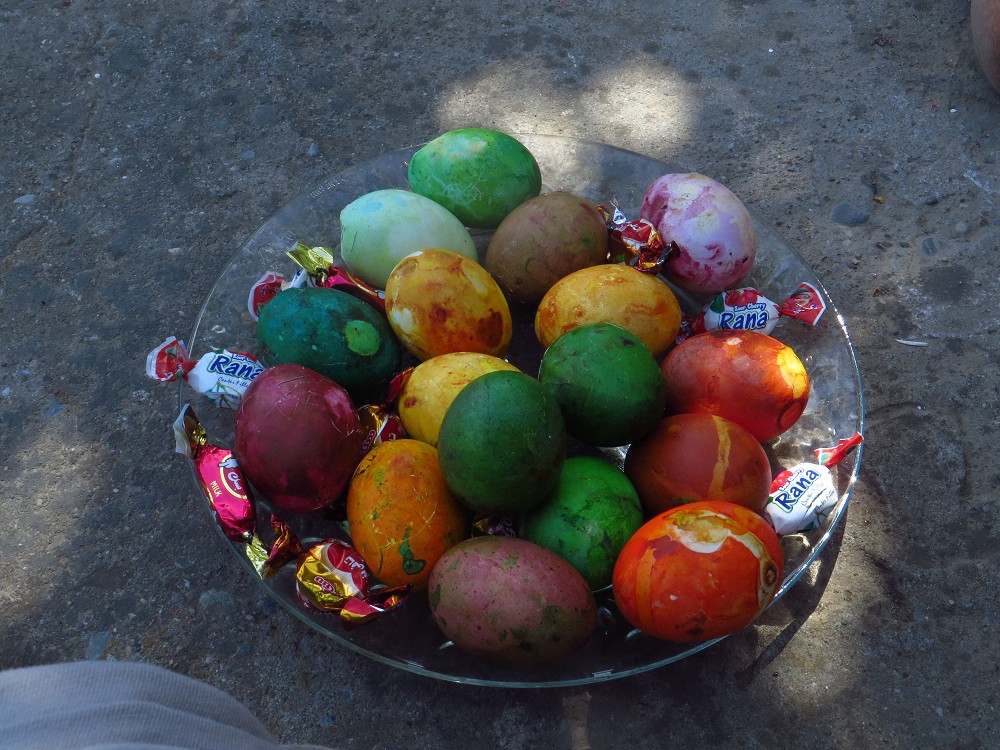
“Have an egg,” he told me, “We will compete, and if I win, I get yours.” I was familiar with the tradition, and in the spirit of competition, hospitality and brotherhood, we both held our eggs vertically. The top egg had to try to crack the bottom one; whoever’s didn’t crack won both. Sam won to cheers from his family, and challenged me to a rematch which I won in return. I asked about the significance of the eggs.
“It is simple really, the egg,” he explained, “the beginning of the cycle of life. Everything comes from the egg. And all of the colors? Because every life has different colors! It helps that eggs taste good too!” He added for good measure and a quick laugh. After Sam and I had our fill of eggs, we sat and talked, and after some time I told him I wanted to explore some other parts of the village for a while. He obliged, and told me that as his family’s honored guest I was not only invited, but expected to partake in their lunch feast. I accepted and gave him my phone number before I left.

I continued wandering around and stopping to drink tea and talk with people. One young man named Kalar stopped and thanked me for taking the time to visit. He took it upon himself to be my informal guide and showed me a few of the small temples scattered across the village. At one temple, an older man sat beside the door as if he were a guard; he welcomed and greeted everyone as they came in. Directly above him, over the door crest, a vibrant red poppy was stuck to the frame, held in place by a sort of surprisingly cohesive Yazidi stucco made from egg.
The informal guard thanked me and shook my hand for patronizing his temple. He told me, “Many of us are sad, but it is important to keep the good things we have. Most of us have lost a lot in the last few years. For all of the people we love who we have lost we still have many more that we love, and today is important for us to remember everyone and enjoy seeing everyone else. I am glad that you are here, because it shows that the world cares.” I thanked him in return, and after sharing a chai, continued through the steep village.
Time passed quickly as I hopped along, and when my pocket started buzzing, I knew Sam was calling to make sure I was on my way for lunch. I looked out over a rooftop just before rejoining Sam and his family; the number of people in Lalish had now climbed into the tens of thousands. I said my hellos once more upon revisiting Sam, and with a warming “Karemka!” which loosely translates to “enjoy the feast,” he beckoned us all to begin. Lunch was extensive, with many different families’ versions of dolma and chicken biryani rice.
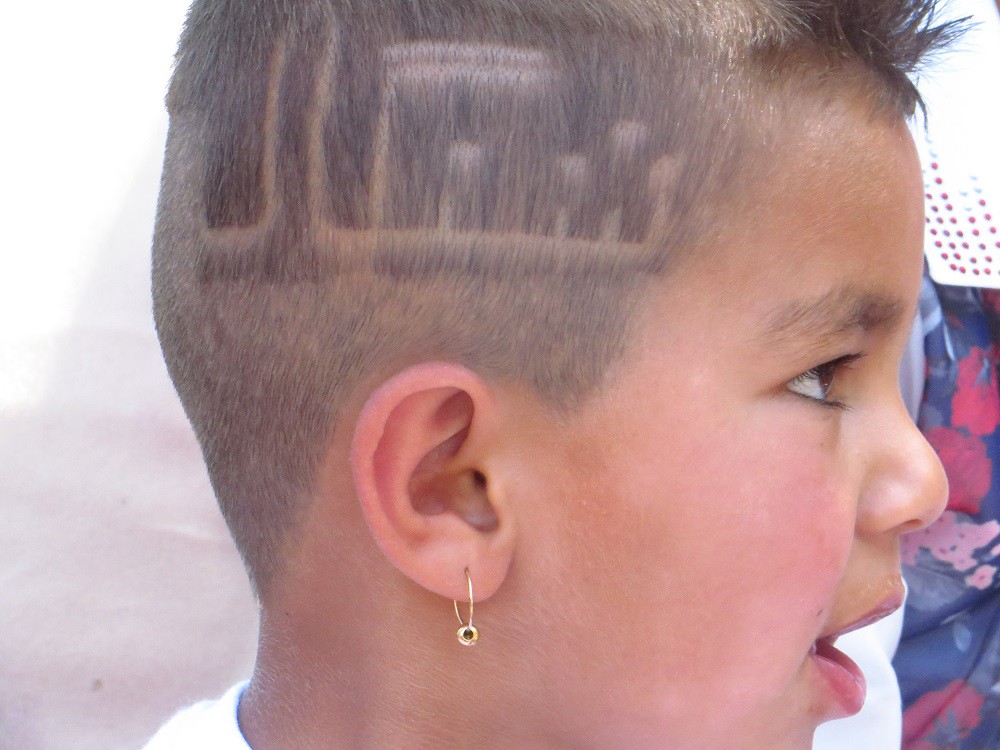
After lunch, Sam beckoned for his young son, Oman, to come shake my hand. He was no older than four, but he already had his father’s warm smile. Oman blushed and gave me a small wave before he hesitantly shook my hand. I noticed he had something shaved into the side of his head. I understood just enough of the Arabic alphabet to figure out that it said “Shingal.” I asked Sam if he and his family had come from Shingal. “Yes,” he replied, “I am Shingali. Everyone sitting here with you is. We left in 2014, and we have been living in a camp ever since.”

Yazidism is a dualistic religion that rejects the notion of sin and instead considers it part of the same reality as goodness. Its most important figure in the faith after God is the Peacock Angel, Melek Taus, who some argue is parallel to “Shaitan” in Islamic texts, or Satan in Christianity — the embodiment of sin and evil, providing the strong dualistic balance to god’s empathy, compassion, and goodness. Because of this origin story, Yazidis have been negatively stereotyped by some Muslims as devil worshippers.
The story goes, after God created the world, he entrusted it to seven angels, Melek Taus among them. He was a proud and arrogant angel, and refused to submit to God and bow to Adam. When brought before God, he was able to recognize his faults and identify his wrongdoings. He was spared punishment in recognition for his boldness, and after repenting, was reborn as the Peacock Angel. His story symbolizes the redeemable nature of many who wrong, and Yazidis’ rejection of outright evil. The Yazidis’ archangel is symbolically flawed, correctible, and human as those on earth who worship him.
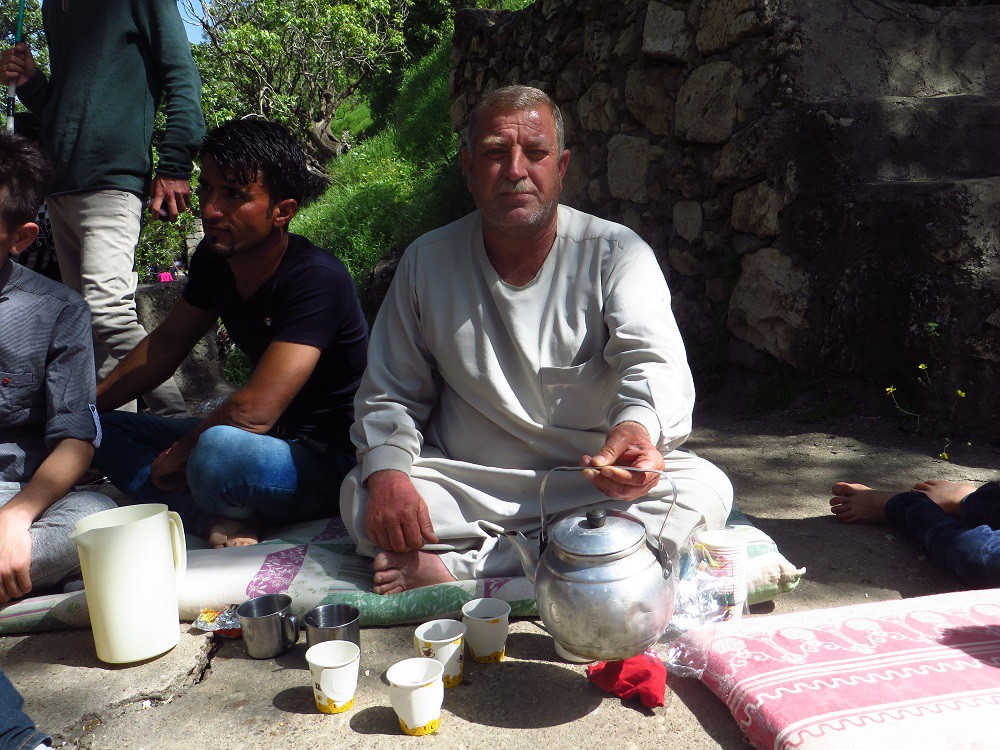
I asked Sam to tell me what he thought was the most important thing that the world should know about Yazidis.
“I want them to know who we are, and that we only want peace,” he said. “I want you to feel comfortable in my home, and for my home to be your home. I want you to know that if you respect me once, I will respect you one hundred times.”
Sam continued, “You know, even though we are safer now, it is not safe here. People do not like us, and I do not mean just Da’esh. It’s not safe here, but I want to stay. I have family in America, and I have family in Germany. But I do not want to leave, because if everyone who wants peace keeps leaving here, who will there still be to keep it? Peace can only be built by those who want it and are willing to stay.”
For Yazidis, New Year’s Day is a celebration of Melek Taus and the circular process of life and death, as well as the tremendous resilience of their people and survival through consistent adversity. From the hilltop above them, war is still visible. But in the valley below, generosity and life go on unabated. The war will eventually come to an end, and when it does, it will need people like Sam and his family, who are willing to stay and invest in the peace that follows, and build new cycles of life.
Joke Explained
Jarvis has argued, somewhat diplomatically, that Bradbury is free to satirize him and his work — just as long as he keeps his name out of it. “The issue was not satire but acquisition of my name [and] fooling readers of an allegedly journalistic enterprise,” he tweeted yesterday. What Jarvis misunderstands is that a satire of Jeff Jarvis inherently requires using the name of Jeff Jarvis, just as a coherent satire of Donald Trump, such as this Onion column by “Donald Trump,” requires the use Trump’s name to have any comic effect. This tradition of humor-by-impersonation-and-exaggeration stretches back centuries, to the playwrights of Ancient Greece. And the ever-present possibility that certain people might mistake a satire for reality is the very thing that makes satire funny. As Ken White, the aforementioned First Amendment lawyer, observed, “The joke is not only at the expense of Jeff Jarvis. The joke is, in part, at the expense of people who read carelessly.”
Are you happy now, Jiff Jervis?
One Minute Of Exercise Is The Same As Forty-Five Minutes Of Exercise
The interval makes no difference; you’re still going to die.
